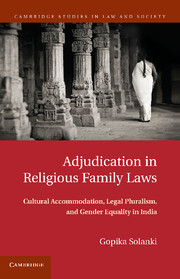 Adjudication in Religious Family Laws
Adjudication in Religious Family Laws Regulation of Matrimonial Matters in Muslim Personal Law
Published online by Cambridge University Press: 03 May 2011
Introduction
This chapter outlines the nature of adjudication in matrimonial matters under Muslim Personal Law in Mumbai. The chapter highlights the interplay between state law and nonstate law, analyzes the interaction between multiple sources of legal authority, and discusses the processes of community-initiated reforms in Muslim Personal Law. Given that multiple societal actors and bodies adjudicate and produce law, the adjudication process demonstrates how the content of Muslim Personal Law itself is a subject of contestations between law-producing and law-legitimating agents. This chapter demonstrates that multiple representations and understandings of “the Muslim family” and Muslim women's rights within the family coexist in the adjudicative arenas, and shows how these are tied to different understandings of “Muslimness.” Thus, the religious identity premised upon in Muslim religious family law is fluid and subject to constant revision.
This chapter also discusses the impact of these state-society interactions on women's rights in law, describes how the decentralized legal sphere offers avenues for women's agency, and shows the limits of this agency given the asymmetrical position of women within the family, society, and the law.
The Nature of Muslim Personal Law and the Classification of Legal Actors and Institutions in Societal Arena
Muslim Personal Law in postcolonial India is based on local custom, Islamic laws and precepts, customary laws made by sect-based organizations, state-law enactments, and judicial precedent. The state courts administer the uncodified Muslim Personal Law as well as state-enacted law.
To save this book to your Kindle, first ensure [email protected] is added to your Approved Personal Document E-mail List under your Personal Document Settings on the Manage Your Content and Devices page of your Amazon account. Then enter the ‘name’ part of your Kindle email address below. Find out more about saving to your Kindle.
Note you can select to save to either the @free.kindle.com or @kindle.com variations. ‘@free.kindle.com’ emails are free but can only be saved to your device when it is connected to wi-fi. ‘@kindle.com’ emails can be delivered even when you are not connected to wi-fi, but note that service fees apply.
Find out more about the Kindle Personal Document Service.
To save content items to your account, please confirm that you agree to abide by our usage policies. If this is the first time you use this feature, you will be asked to authorise Cambridge Core to connect with your account. Find out more about saving content to Dropbox.
To save content items to your account, please confirm that you agree to abide by our usage policies. If this is the first time you use this feature, you will be asked to authorise Cambridge Core to connect with your account. Find out more about saving content to Google Drive.